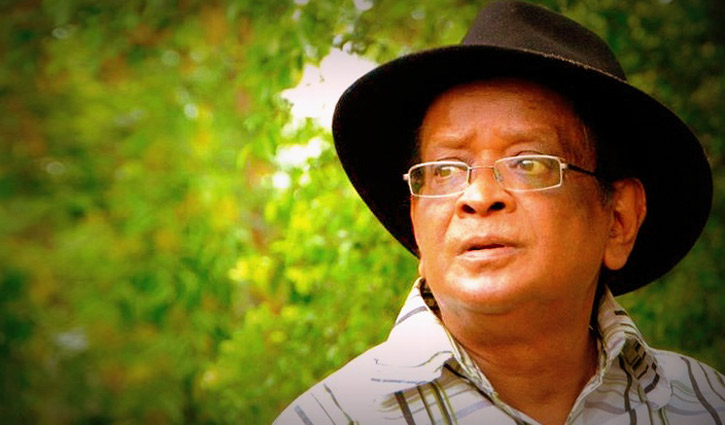Tanisha Mahmud Salam Rebash
Humayun Ahmed is an extremely popular writer, film-maker, music director, dramatist in Bangladesh. The reasons behind his success are: Humayun’s love for mankind and nature, his understanding of mass people’s characteristics, and his way of using simple language for his writings. His characters represent ordinary men. After Satyajit Ray, Humayun Ahmed is the person who not only showed his interest in literature but also in music. Through his memorable and outstanding works, he has proved his excellence. Nobody has gained as much success and fame as him in Bengali literature and cinema in recent years. He created magic and introduced timeless characters like Himu, Shuvro, Misir Ali and won million readers’ hearts.
I am a genuine enthusiast of Humayun Ahmed’s writings. When I was twelve years old, I started reading his works and entered a whole different world. A world of dreams and imagination. When I read his novels, I feel joy and excitement. Humayun Ahmed has tried about all possible genres. For example- novels, short stories, film scripts, lyrics, travelogues, plays, autobiographies and so on. My favorite fictional characters are Himu, Shubhro and Misir Ali. Followed here is a brief glimpse into those men:
Himu, a Shadow Man from Another World: Himu or Himalay is an exceptional character sketched by Humayun Ahmed. The character Himu first appeared in the novel titled Mayurakkhi published in 1990. Responding to the popularity of this novel, the author wrote more than 21 novels centering Himu. Each book of the Himu series is very popular among the young generation. Though this character is mostly addressed as ‘Himu’, his full name is Himalay, which was given by his father. In each novel, Himu is found to maintain an eccentric and mysterious lifestyle unlike the other youths of his age. His unconventional bohemian way of living is motivated by a diary written by his psychopathic father who wanted to raise him to be a ‘mohapurush’ or great man. The character Himu surprises the readers through his weird but amusing attitudes. For instance, Himu dares to mock police officers without any fear of getting arrested or being molested. He wears a pocket-less ‘holud panjabi’ and enjoys a nomadic life. Most days, he tends to walk barefoot on the streets of Dhaka city. During those endless journeys, Himu neither uses any kind of transport nor tries to reach any certain destination. Himu is unemployed and prefers to live on begging instead of doing any kind of work. Throughout the series, the unorthodox outlook of Himu keeps the readers captivated. While in real life, young people are often facing pressure regarding study, career, or relationships, the carefree lifestyle of Himu gives readers temporal relief. In fact, many of us secretly bear the hidden wish to be like ‘Himu’. Himu has some followers, too- including police officers, neighbors, relatives, tea stall proprietors, beggars, etc- who believe in his spiritual power of forecasting future events. But what Himu really does is confront people with unpleasant truths, which is quite rare in this sophisticated fake society. Instead of looking for logical explanations like Misir Ali, Himu perceives that the strength of beliefs can make things happen.
Shubhro, a Dream Boy: Shubhro is a fictional character developed by Ahmed who performs the role of a pure human being. His is a character who likes to dream. He says like the famous writer Earnest Hemingway that he would like to write a novel. The novel will be known as The Young Man and The Tree. The character Shubhro, whose name translates as ‘white’ in Bangla, is meant to be a pure soul, set apart from the complicated world. Unlike Himu or Misir Ali, Shubhro appears like a next-door boy with an easy-going character. He represents the iconic figure of a helpful friend who is always there to help. Ahmed sketched his fictional character Shubhro as a role model for his readers. He is the only child of the couple of industrialists, Mr. Motahar Hossain and Rehana. The ideal mother-son relationship between Shubhro and Rehana makes these stories blissful. However, in some parts of the series, the author put Shubhro in dilemmas and revelations to test the purity of his soul. From one book to another the character shows significant versatility unlike other characters created by Ahmed. In every story, the common things about Shubhro include his name, thick-rimmed glasses, and a pure soul. He owns a distant nature and acts as a bystander. He is not the protagonist who saves everyone, but tries to alleviate situations in his own ways. The character debuted in the short story titled “Ekti Shada Gari” in one of Ahmed’s early writings. As this character achieved much popular attention, Ahmed brought more novels about Shuvro. Daruchini Dip, Megher Chaya, Rupali Dip, Shubhro, Ei Shuvro Ei and Shuvro Geche Bone. The novel titled Daruchini Dip was adapted as a Bengali film in 2007 starring prominent actor Riaz as Shubhro.
Misir Ali, a Mysterious Character: Misir Ali is a mysterious character who appeared in a series of novels written by Humayun Ahmed. In the books, Misir Ali is portrayed as a part-time professor of Psychology at the University of Dhaka. Though Ali is not a professional psychiatrist, he has a unique interest and some outstanding forte in parapsychology. In the novels, we found that people seek help from Ali regarding diverse psychiatric problems. Despite being efficient in solving mysteries, he never takes money for this special service. According to Ahmed’s novels, Misir Ali is a bachelor who lives in a small flat with a servant or sometimes alone. He lost both of his parents at a young age and was raised by his relatives. Though he is a chain smoker, he tries to quit smoking in every story. The mystifying but humorous lifestyle of Misir Ali amuses the readers. The Misir Ali series includes 20 books altogether.
I want to conclude by saying that although Humayun Ahmed is not with us anymore, his creations, Himu, Shubhro and Misir Ali will always be alive. We will never forget this literary genius.

